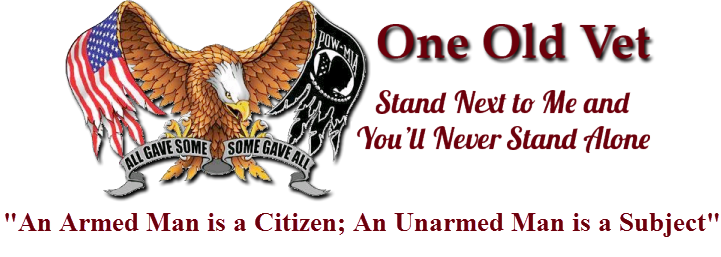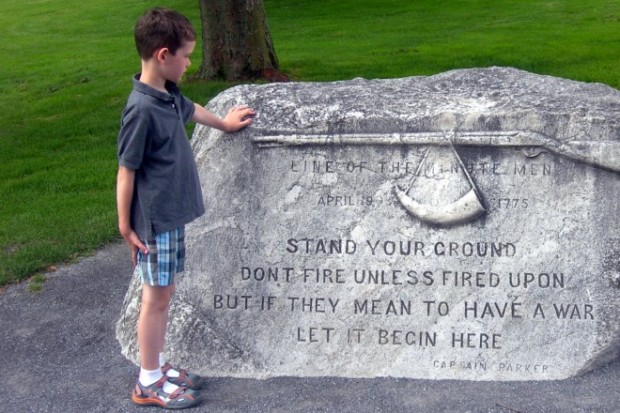It looks like you're using an Ad Blocker.
Please white-list or disable AboveTopSecret.com in your ad-blocking tool.
Thank you.
Some features of ATS will be disabled while you continue to use an ad-blocker.
43
share:
Give me truth my faithful friends and this will make us strong,
Give me hope my loyal Men that we may right the wrong.
Give me faith oh Minute Men, and fear shall disappear,
Give me God beside my arm for victory is near.
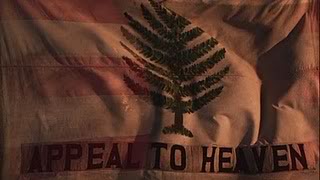
Having set out on foot from Boston the night before, On the morning of April 19th, 1775, 900 British regular forces under the command of Lt. Col. Francis Smith were marching on the King's Highway towards Concord, Massachusetts, 17 miles away in the countryside. Their objective was to find and capture weapons and ammunition hidden by the rebel forces in Concord, as General Gage had issued a ban on private ownership of weapons and ammunition earlier in the week. Their other objective was to punish the farmer-rebels of Concord whom recently hosted the illegal Provincial Congress in an attempt at self government. The British obtained the hidden location of the arms cache from the Tories of the area who were still loyal to the Crown of King George.
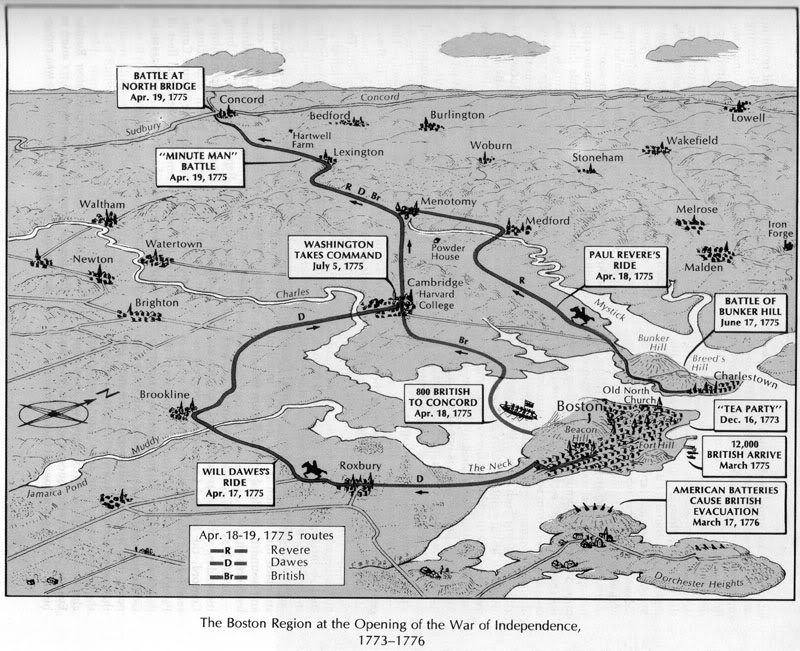
"The British are coming! The British are coming!" The American alarm system went into action, and riders were sent by several routes to notify all the militia companies throughout the colony that British regulars were marching with the intention to take the arms at Concord. As the British column of red-coated soldiers marched westward they began to hear strange sounds they were not used to hearing in the colonies: bells were ringing in the distance ahead of them, and alarm guns being fired to waken the population.
In the village of Lexington, which lay right along the road to Concord, the residents prepared for a fight they knew was imminent. Captain John Parker’s militiamen gathered at Munroe Tavern to await word about the arrival of the British Army. The presence of John Hancock and Samuel Adams, the two men most wanted by royal authorities, made Lexington a target for the redcoats' attention on their way to Concord.
Shortly after dawn on the 19th of April, 38 militiamen of Lexington confronted the 900 British regulars on Lexington Green.
As the British vanguard formed up in a battle line facing the militia, Colonel Smith, the British commander, was pleasantly surprised by the small size of the American force. He ordered the colonists to throw down their arms and disperse.
Though vastly outnumbered, Captain Parker replied to his men:
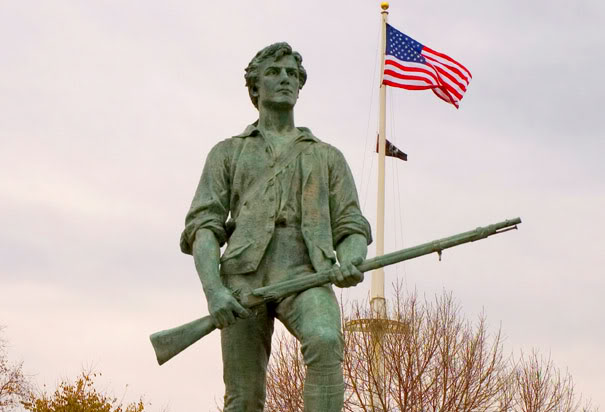
BANG! A single shot was fired, followed by dozens more. Whether the shot was fired by a the rebel militia or the British has been lost to history. When the smoke cleared, 18 Americans lay dead or wounded and one British soldier was slightly wounded. The outmatched Minutemen retreated into the nearby woods and the redcoats proceeded westward to their main objective, Concord. As the sun rose, they could see the ghostly shadows of men in the distance, moving across the open countryside from all directions heading toward Concord.
At seven o’clock in the morning the British reached their main objective, the tiny village of Concord. The Redcoats occupied the village center and proceded to march a few hundred yards west to the Concord River, in an effort to seize the Old North Bridge. The British suspected the farm houses on the opposite side of the river to be harboring the arsenal of illegal rebel arms.
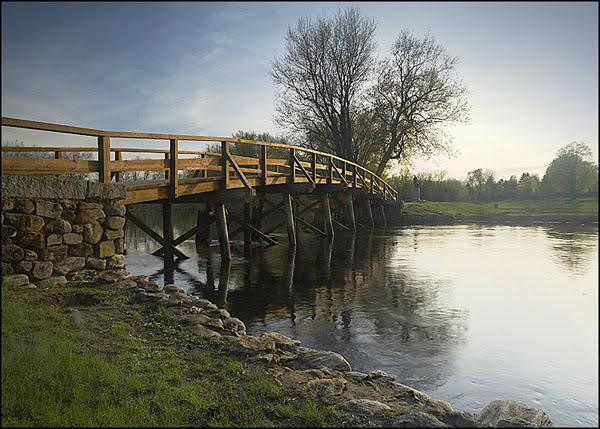
However, as the British massed their troops upon the bridge, they were not alone. The Redcoats were being watched. About 250 armed farmers gathered on Punkatasset hill above the Old North Bridge, about 300 yards away. These men were lead by their representative, Colonel James Barrett, a Concord farmer and veteran of the French and Indian war. They were unaware of what had just happened at Lexington Green.
As the Minutemen observed the King's men from the hill, something else caught their watchful eye. A pale column of smoke rose over the trees. The British were burning Concord, which lay past the British held side of the river. Joseph Hosmer, Colonel Barrett's second in command turned to Barrett and exclaimed, "Will you let them burn the town down?" Local militia leader, Isaac Davis drew his sword, and, turning to Barret, said: "I haven't a man that's afraid to go."
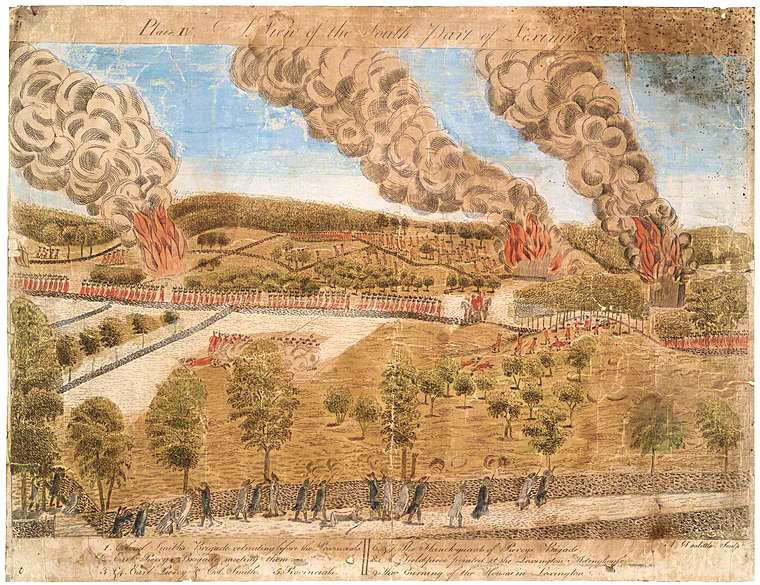
Colonel Barrett gave the order to march in defense of Concord. These men resolved to march over the bridge into the middle of the village to defend their homes, or die in the attempt. These farmers, fisherman, woodsman; mostly fathers and their adolescent sons, marched down from the hill toward the bridge.
A child fifer in the lead bravely fluting “The White Cockade”.
The British were immensely surprised, not only to see a small band of farmers on the hill, but to their shock, they were advancing! The Redcoats withdrew to the village side of the bridge and massed around the narrow span. They had to hold the bridge. Colonel Smith had his orders from General Gage, and he meant to carry them out. With their hundreds of glistening guns pointed toward the river, the British soldiers took aim. The rebels kept coming. A shot rang out. A shot heard 'round the world. A rag-tag band of farmers confronted the King's best soldiers... and beat them.
Give me hope my loyal Men that we may right the wrong.
Give me faith oh Minute Men, and fear shall disappear,
Give me God beside my arm for victory is near.

Having received Intelligence, that a Quantity of Ammunition, Provision, Artillery, Tents and small Arms, have been collected at Concord, for the Avowed Purpose of raising and supporting a Rebellion against His Majesty, you will March with the Corps of Grenadiers and Light Infantry, put under your Command, with utmost expedition and Secrecy to Concord, where you will seize and destroy all Artillery, Ammunition, Provisions, Tents, Small Arms, and all Military Stores whatever - Per Order of General Gage to Lt. Colonel F. Smith, of the Kings Troops
Having set out on foot from Boston the night before, On the morning of April 19th, 1775, 900 British regular forces under the command of Lt. Col. Francis Smith were marching on the King's Highway towards Concord, Massachusetts, 17 miles away in the countryside. Their objective was to find and capture weapons and ammunition hidden by the rebel forces in Concord, as General Gage had issued a ban on private ownership of weapons and ammunition earlier in the week. Their other objective was to punish the farmer-rebels of Concord whom recently hosted the illegal Provincial Congress in an attempt at self government. The British obtained the hidden location of the arms cache from the Tories of the area who were still loyal to the Crown of King George.

"The British are coming! The British are coming!" The American alarm system went into action, and riders were sent by several routes to notify all the militia companies throughout the colony that British regulars were marching with the intention to take the arms at Concord. As the British column of red-coated soldiers marched westward they began to hear strange sounds they were not used to hearing in the colonies: bells were ringing in the distance ahead of them, and alarm guns being fired to waken the population.
In the village of Lexington, which lay right along the road to Concord, the residents prepared for a fight they knew was imminent. Captain John Parker’s militiamen gathered at Munroe Tavern to await word about the arrival of the British Army. The presence of John Hancock and Samuel Adams, the two men most wanted by royal authorities, made Lexington a target for the redcoats' attention on their way to Concord.
Shortly after dawn on the 19th of April, 38 militiamen of Lexington confronted the 900 British regulars on Lexington Green.
What a glorious morning this is!--Samuel Adams, to John Hancock April 19th 1775
As the British vanguard formed up in a battle line facing the militia, Colonel Smith, the British commander, was pleasantly surprised by the small size of the American force. He ordered the colonists to throw down their arms and disperse.
Throw down your arms, ye villains, ye Rebels, Disperse!
Though vastly outnumbered, Captain Parker replied to his men:
Stand your ground; don't fire unless fired upon, but if they mean to have a war, let it begin here!

BANG! A single shot was fired, followed by dozens more. Whether the shot was fired by a the rebel militia or the British has been lost to history. When the smoke cleared, 18 Americans lay dead or wounded and one British soldier was slightly wounded. The outmatched Minutemen retreated into the nearby woods and the redcoats proceeded westward to their main objective, Concord. As the sun rose, they could see the ghostly shadows of men in the distance, moving across the open countryside from all directions heading toward Concord.
"God wills us free; man wills us slaves: I will as God wills; God's will be done."
At seven o’clock in the morning the British reached their main objective, the tiny village of Concord. The Redcoats occupied the village center and proceded to march a few hundred yards west to the Concord River, in an effort to seize the Old North Bridge. The British suspected the farm houses on the opposite side of the river to be harboring the arsenal of illegal rebel arms.

However, as the British massed their troops upon the bridge, they were not alone. The Redcoats were being watched. About 250 armed farmers gathered on Punkatasset hill above the Old North Bridge, about 300 yards away. These men were lead by their representative, Colonel James Barrett, a Concord farmer and veteran of the French and Indian war. They were unaware of what had just happened at Lexington Green.
As the Minutemen observed the King's men from the hill, something else caught their watchful eye. A pale column of smoke rose over the trees. The British were burning Concord, which lay past the British held side of the river. Joseph Hosmer, Colonel Barrett's second in command turned to Barrett and exclaimed, "Will you let them burn the town down?" Local militia leader, Isaac Davis drew his sword, and, turning to Barret, said: "I haven't a man that's afraid to go."

Colonel Barrett gave the order to march in defense of Concord. These men resolved to march over the bridge into the middle of the village to defend their homes, or die in the attempt. These farmers, fisherman, woodsman; mostly fathers and their adolescent sons, marched down from the hill toward the bridge.
A child fifer in the lead bravely fluting “The White Cockade”.
The British were immensely surprised, not only to see a small band of farmers on the hill, but to their shock, they were advancing! The Redcoats withdrew to the village side of the bridge and massed around the narrow span. They had to hold the bridge. Colonel Smith had his orders from General Gage, and he meant to carry them out. With their hundreds of glistening guns pointed toward the river, the British soldiers took aim. The rebels kept coming. A shot rang out. A shot heard 'round the world. A rag-tag band of farmers confronted the King's best soldiers... and beat them.
The Americans seemed to drop from the clouds and we were totally surrounded with such an incessant fire as it is impossible to conceive. -British officer
edit on 04America/Chicago30pm2014-04-18T21:49:41-05:00201404America/Chicago30 by METACOMET because: (no reason given)
William Emerson, the village reverend "who had turned out amongst the first in the morning to animate and encourage his people by his
counsel and patriotic example," and who urged his flock that morning; "Let us stand our ground. If we die, let us die here.”wrote this
account.
As the British retreated to the safety of Boston, they were astonished to find 6,000 Minutemen from local villages had descended upon the outskirts of Concord. The Minutemen waited for the British until they reached Merriams Corner, where they sprung upon them. The Minutemen hid behind trees and stone fences to attack the British from both sides of the "King's" road. They were harried every step of the way. The British mission was a failure. The rebel leaders were safe and the colonists had salvaged their cache of arms.
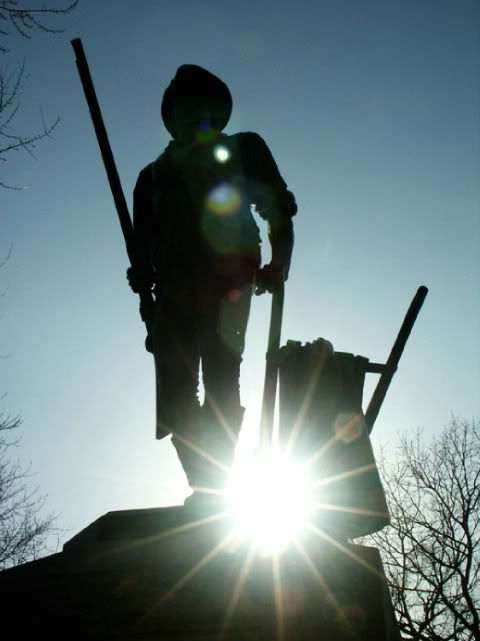
Thus, the “embattled farmers” had won the day. The Revolution was on; there was no turning back. The British crossed the Charles River to what they thought was the safety of Tory occupied Boston. However, they were wrong. Tens of thousands of American militiamen surrounded Boston and began what is now known as the "Siege of Boston" and the battle of Breeds "Bunker" Hill. Eventually the British had no choice but to retreat from Boston once and for all, by way of ship. Soon after Boston was liberated by the revolutionary forces, Washington began his Continental Army campaigns to the south, eventually winning the war outright in the years to come.
Never forget.
For half and hour, the enemy, by their continuous marches, discovered great fickleness and inconstancy of mind; till at length they quitted the town, and retreated by the way they came. In the meantime a party of our men took the back way, through the Great Fields, into the east quarter, and had placed themselves to advantage, lying in ambush behind walls, fences and buildings, ready to fire upon the enemy on their retreat.
As the British retreated to the safety of Boston, they were astonished to find 6,000 Minutemen from local villages had descended upon the outskirts of Concord. The Minutemen waited for the British until they reached Merriams Corner, where they sprung upon them. The Minutemen hid behind trees and stone fences to attack the British from both sides of the "King's" road. They were harried every step of the way. The British mission was a failure. The rebel leaders were safe and the colonists had salvaged their cache of arms.
The Sword is now drawn, and God knows when it will be sheathed.

Thus, the “embattled farmers” had won the day. The Revolution was on; there was no turning back. The British crossed the Charles River to what they thought was the safety of Tory occupied Boston. However, they were wrong. Tens of thousands of American militiamen surrounded Boston and began what is now known as the "Siege of Boston" and the battle of Breeds "Bunker" Hill. Eventually the British had no choice but to retreat from Boston once and for all, by way of ship. Soon after Boston was liberated by the revolutionary forces, Washington began his Continental Army campaigns to the south, eventually winning the war outright in the years to come.
That blood stain, on the vernal sword,
Hallowed to freedom all the shore;
In fragments fell the yoke abhorred---
The footsteps of a foreign lord
Profaned the soil no more.
By rude bridge that arched the flood,
Their flag to April's breeze unfurled,
Here once the embattled farmers stood
And fired the shot heard round the world.
-Ralph Waldo Emerson, Concord, 1837
Never forget.
edit on 04America/Chicago30pm2014-04-18T21:32:28-05:00201404America/Chicago30 by METACOMET because: (no reason given)
Wonderful mate. This story gives me chills everytime...We can all only hope for another April 19th such as this one, sooner rather than later
Don't mean to be cheezy' but that gave me the chills.
Makes me proud.
Eta: lightedhype beat me to it!
Makes me proud.
Eta: lightedhype beat me to it!
edit on 4/18/2014 by TiedDestructor because: of aliens
originally posted by: lifeisgreat
This should have been read at every school in the country yesterday. a reply to: UxoriousMagnus
I'll second that for sure !
SnF
a reply to: METACOMET
S+F
A well written summary about the beginning of a great story indeed.
Are you implying you're not teaching your kids about this anymore?
S+F
A well written summary about the beginning of a great story indeed.
originally posted by: lifeisgreat
This should have been read at every school in the country yesterday. a reply to: UxoriousMagnus
Are you implying you're not teaching your kids about this anymore?
edit on 18-4-2014 by ColCurious because: (no reason given)
Perhaps it will come true Semper Fidelis Veritas Aequitas \m/
Where, oh where did that proud and upstanding American nation go? To read the tale swells my chest with the satisfaction of hard-won freedom, but I
now look around...and to my dismay, I see none of what I just read. Only tombs stand testament to the battles we fought, and were their ghosts
lingering on the soil for which they gave their lives, I suspect they would no longer recognize the world they sought to defend. And as admirable as
this historical account is, it is all the more saddening to realize that it becomes more and more lost in history, and less and less relevant to the
government we toil under today. Is this what we now call independence? Is this what they called independence? I read this account, and I fear the
answer to that question. Which I think is answer enough in its own right.
originally posted by: UxoriousMagnus
I love how you called out the word "farmer" every time as well...
In this day and age I suppose using the term "terrorist" would have been more PC.
Clealy this was a false flag by French Intelligence backed by the Spanish so they could intervene and weaken the British Empire. Those were French
and Spanish trained agents who started the war so they could get involved. MSM would never reporty that.
The Concord River is remarkable for the gentleness of its current, which is scarcely perceptible, and some have referred to its influence the proverbial moderation of the inhabitants of Concord, as exhibited in the Revolution, and on later occasions.
You shall see men you never heard of before, whose names you don't know, going away down through the meadows with long guns, wading through the fowl-meadow grass, on bleak, wintry, distant shores, with guns at half-cock, and they shall see teal, blue-winged, green-winged, shelldrakes, whistlers, black ducks, ospreys, and many other wild and noble sights before night, such as they who sit in parlors never dream of.
You shall see rude and sturdy, experienced and wise men, keeping their castles, or teaming up their summer's wood, or chopping alone in the woods, men fuller of talk and rare adventure in the sun and wind and rain, than a chestnut is of meat; who were out not only in '75 and 1812, but have been out every day of their lives; greater men than Homer, or Chaucer, or Shakespeare, only they never got time to say so; they never took to the way of writing. Look at their fields, and imagine what they might write, if ever they should put pen to paper.
-Henry D. Thoreau 1839
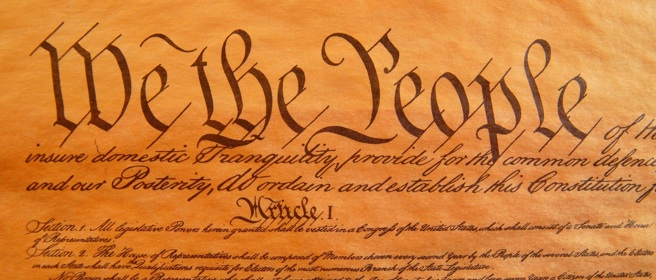
The Americans had firearms made for one shot one kill hunting.
The British "Brown Bess" Musket could reliably hit a man sized target out to about 50 yards, or less. Muskets were made to fire in volleys at massed enemy formations and fix bayonets at the muzzle.
The American rifles could not fix bayonets, but could hit a man sized target a distances of 200 to 400 yards and over.
The Americans could have fought the war a lot differently than they did. The Americans could have used a kill the leaders tactic like the Germans used against the Russians in WW2.
Rifled firearms saw their first major combat usage in the American colonies during the Seven Years war, and later the American Revolution in the eighteenth century.
The longrifle is an early example of a firearm using rifling, (spiral grooves in the bore). This gave the projectile, commonly a round lead ball, a spiraling motion, increasing the stability of the trajectory. A more stable trajectory meant dramatically improved accuracy over the more commonly available smooth bore muskets also used in the period.
Until the development of the Minié ball in the middle of the 19th century, the main disadvantages of a rifle compared to a musket were a slower reload time due to the use of a tighter fitting lead ball and greater susceptibility to the fouling of the bore after prolonged usage - such fouling would eventually prevent loading altogether, rendering the weapon useless until thoroughly cleaned.
en.wikipedia.org...
The British "Brown Bess" Musket could reliably hit a man sized target out to about 50 yards, or less. Muskets were made to fire in volleys at massed enemy formations and fix bayonets at the muzzle.
The American rifles could not fix bayonets, but could hit a man sized target a distances of 200 to 400 yards and over.
The Americans could have fought the war a lot differently than they did. The Americans could have used a kill the leaders tactic like the Germans used against the Russians in WW2.
traitors to the crown and terrorists.
One day when you colonise Mars, they will tell you to bugger off and seek independence! Seeking to keep all the new resources and history will repeat.
Weird thing is, liberty and freedom in modern day America is broken. you are all ruled by corporations.
At least your new rulers, you have to bow down to, are home grown.
One day when you colonise Mars, they will tell you to bugger off and seek independence! Seeking to keep all the new resources and history will repeat.
Weird thing is, liberty and freedom in modern day America is broken. you are all ruled by corporations.
At least your new rulers, you have to bow down to, are home grown.
edit on 19-4-2015 by ProleUK because: (no reason given)
new topics
-
The hunter has become the hunted
Politicians & People: 2 hours ago -
Trump's idea to make Canada the 51st US state: 'Potential is massive'
Mainstream News: 3 hours ago -
Well this is Awkward .....
Mainstream News: 7 hours ago -
Kurakhove officially falls. Russia takes control of major logistics hub city in the southeast.
World War Three: 9 hours ago
top topics
-
Well this is Awkward .....
Mainstream News: 7 hours ago, 17 flags -
The hunter has become the hunted
Politicians & People: 2 hours ago, 16 flags -
Trump's idea to make Canada the 51st US state: 'Potential is massive'
Mainstream News: 3 hours ago, 12 flags -
Liberal Madness and the Constitution of the United States
US Political Madness: 15 hours ago, 10 flags -
Kurakhove officially falls. Russia takes control of major logistics hub city in the southeast.
World War Three: 9 hours ago, 9 flags
active topics
-
Trump's idea to make Canada the 51st US state: 'Potential is massive'
Mainstream News • 31 • : GENERAL EYES -
Kurakhove officially falls. Russia takes control of major logistics hub city in the southeast.
World War Three • 7 • : nugget1 -
Meta Llama local AI system is scary good
Science & Technology • 33 • : ArMaP -
Plane Crash Today --Azerbaijanian E190 passenger jet
Mainstream News • 48 • : GENERAL EYES -
New York Governor signs Climate Law that Fines Fossil Fuel Companies
US Political Madness • 29 • : NeedInfo -
Well this is Awkward .....
Mainstream News • 26 • : NeedInfo -
The hunter has become the hunted
Politicians & People • 11 • : hangedman13 -
Liberal Madness and the Constitution of the United States
US Political Madness • 13 • : charlest2 -
This is why ALL illegals who live in the US must go
Social Issues and Civil Unrest • 33 • : GENERAL EYES -
Elon Musk futurist?
Dreams & Predictions • 20 • : GENERAL EYES
43

